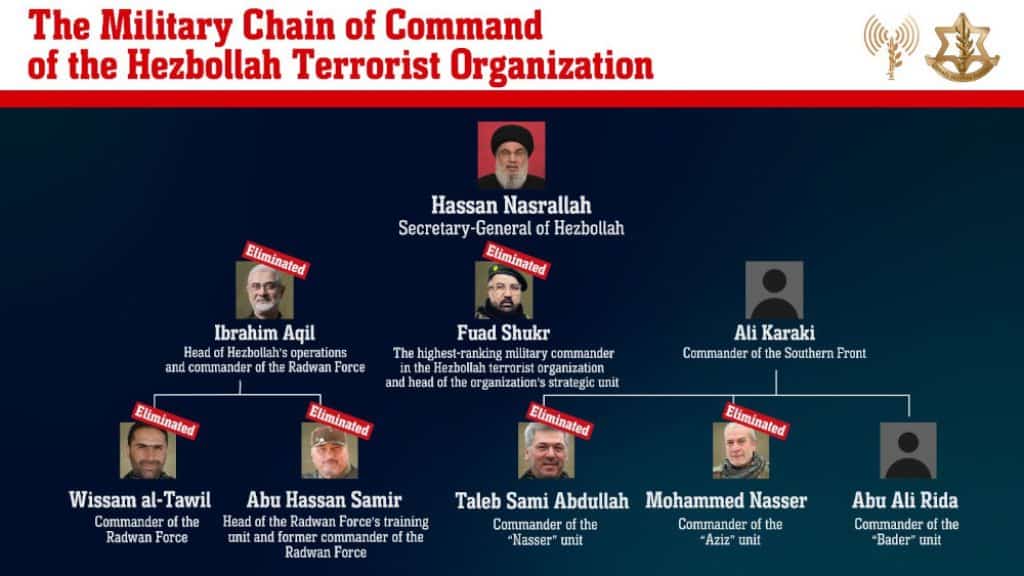
The Israel Defense Forces (IDF) said it carried out a successful airstrike in Beirut on September 20, targeting a meeting involving senior Hezbollah member Ibrahim Aqil and commanders of the group’s elite Radwan Unit.
“Earlier today, the IDF conducted a targeted strike in Beirut, eliminating Ibrahim Aqil, the head of the Hezbollah terrorist organization’s operations unit, along with the senior chain of command of the Radwan Force. They were gathered underground, beneath a residential building in the heart of the Dahieh neighborhood, using civilians as human shields. They had gathered to coordinate terrorist activities against the citizens of Israel,” said IDF Spokesperson Daniel Hagari.
The IDF later confirmed that it killed 16 members of Hezbollah in the Beirut strike.
US authorities sought Aqil for his role in Islamic Jihad that claimed the 1983 bombing of the US embassy in Beirut. Furthermore, the US accused Aqil of orchestrating the kidnapping of American and German hostages in Lebanon during the 1980s.
Israel also wanted Aqil for his role in carrying out a string of attacks against Israeli troops and civilians in recent years.
“Ibrahim Aqil was the head of Hezbollah’s operations and the de facto commander of the Radwan Force, Hezbollah’s elite force. In his role, he was responsible for Hezbollah’s anti-tank, explosives, and air defense operations, among other activities. He orchestrated numerous terrorist attacks, including the 2019 Avivim outpost attack, the 2023 Megiddo Junction bombing, and attempted infiltrations into Israel. He was also behind Hezbollah’s overseas attacks,” said the IDF.
Hezbollah officially confirmed the death of Aqil, some fighters who were attending the meeting, and Ahmed Wahbi, another Radwan commander. However, the group provided few details about their roles in the organization.
Hours following the strike in Beirut, Hezbollah claimed responsibility for targeting an IDF base in northern Israel that it said was responsible for carrying out targeted killing operations.
In support of Hezbollah, Iraqi militias, Hamas, Islamic Jihad, and other terrorist groups belonging to the Iran-led Axis of Resistance published statements of condolence following the strike against the group’s military commanders.
The targeting of Aqil and his comrades follows a string of extraordinary intelligence victories for Israel this week.
On September 17 and 18, pagers and radios belonging to Hezbollah members exploded, potentially maiming thousands of Hezbollah members and killing at least 32. The attacks sowed chaos within Hezbollah’s ranks and caused mass confusion across Lebanon.
While there has been plenty of criticism and protests of Israel over the war in Gaza, there was a significant amount of jubilation on social media in some sectors of the Arab world following the spate of attacks on Hezbollah over the week.
For example, one X user stated, “We stand with Lebanon and its people, except for the Party of Satan [Hezbollah: Party of God] and those who support it, because they are the head of terrorism, and we ask God to eliminate them soon, not later, God willing.”
For much of the war, Hezbollah has viewed itself as having the upper hand over the Israelis. Eleven months of persistent rocket fire against northern Israeli communities, a busy IDF fighting off an Iran-led multi-front war, and an erosion of the Jewish State’s deterrence over the years inflated Hassan Nasrallah’s ego. The dynamic changed significantly this week when Israel humbled Hezbollah. It was a long time coming, yet it was surprising how successful Israel’s operations against the Party of God were.
How and when will Hezbollah respond against Israel is the question on the minds of Israeli military leaders, analysts, and many people living in the region. Retaliation will surely come, but it won’t be a knee-jerk reaction. Hezbollah has demonstrated over the past 11 months that despite initiating a conflict with Israel under the guise of assisting Palestinian civilians in Gaza, it prefers to keep the fighting limited to southern Lebanon. However, after months of rocket fire against Israel and the resounding response by the IDF in the last days, the era of limited conflict may be reaching its conclusion in the days ahead.







